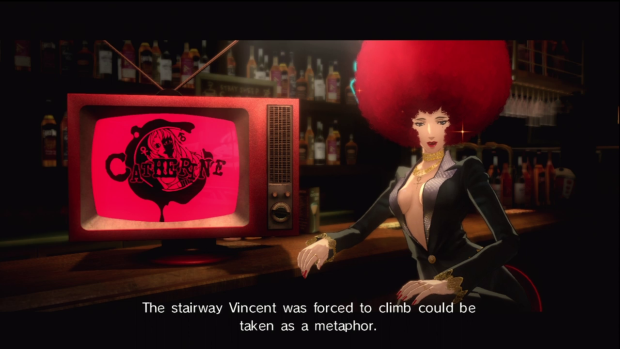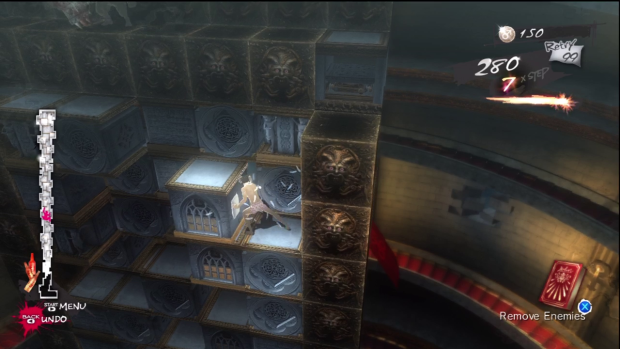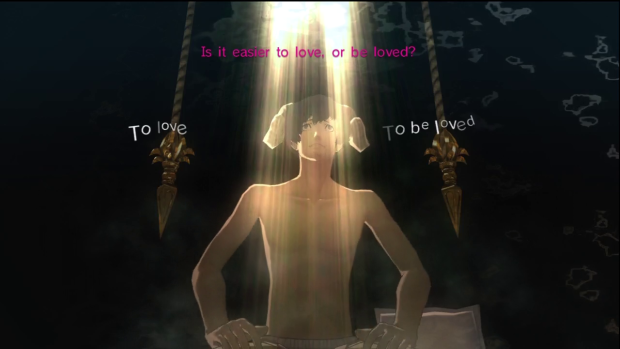This post has not been edited by the GamesBeat staff. Opinions by GamesBeat community writers do not necessarily reflect those of the staff.

Duh! A discussion about Catherine? Some mild spoilers ahead!
When I started playing Atlus' puzzler/relationship-drama Catherine, I wanted to go at it honestly. In other words, if I were presented in real life with the situations and questions that protagonist Vincent faces in the game, I would answer the same way. So as I was forced to make choices between Vincent's love interests (confusingly named Catherine and Katherine), I made all my decisions as if I was staying true to my real girlfriend.
At first I found it hard to imagine seeing the sexy, flirtatious Catherine as anything other than a mysterious temptation — particularly one that challenges my values and morals. I thought my real-life significant other would agree with me to stay with the less-titillating Katherine, Vincent's current girlfriend who wants him to settle down and grow up.
But that wasn't actually the case. Proving to me that I'm a man and not a woman, she actually gave me an argument as to why I should like Catherine, even from the perspective of a female.
"She's so neutral in the whole message. She just lives life," my girlfriend said. "She's confident, she's carefree, she's forward, [and] she does what she wants without caring about the consequences. Like me."
The in-game meter that governs Vincent's state of mind during the story portions isn't a gauge for black-and-white morality; it's something more along the lines of Mass Effect's Renegade/Paragon split. There's nothing really good about choosing the blue side of law, and there's nothing really bad about the pink side of chaos. In the end, the meter simply represents freedom and order and whether the player prefers life slow and steady or fast and exciting.

The puzzle section — where Vincent must ascend level after level of a Q-bert-like tower surrounded by obstacles and enemies — is another story. As narrative guide Midnight Venus says, "There's really no right way to climb the tower." And by the end of the game, it's pretty obvious that the tower represents Vincent's maturation as an adult, leaving behind his comfort zone on the ground floor, forced to make tough decisions in order to reach the top, all while realizing the answer behind the striving in the first place.
Without delving too deeply into the mystery of just who Catherine is, it's obvious that she is the epitome of a young woman who lives by her feelings and nobody else's. So where does that leave Katherine?
Vincent's situation with Katherine is just a perfect storm of problems. She's feeling pressured by her circle of friends and family to settle down and marry someone, which in turn puts the pressure on Vincent…all while Catherine throws normal decision-making out the window.
However, even though we see a lot of Katherine's bossiness contrasting Catherine's free spirit, Katherine does demonstrate that she genuinely cares about Vincent despite how much of a schmuck he is. She texts him to show that she worries, she knows how much sugar he likes in his coffee, and she brings him cake! I really saw Katherine just as the adult world Vincent was hesitant to join, but she represents stability as well — something Vincent could use after weathering the storm of adulthood.
But my girlfriend doesn't really see it that way.
"I couldn't really sympathize with Katherine," she said. "You can't force a guy to date you. I think the relationship was foisted upon him, and being the pushover he is, he didn't say anything. And the thought of him losing her was to him a form of leaving his comfort zone."
Of course, we both agree on what the tower represents, and despite our (well-founded) criticism of Vincent as a character early on, we both acknowledge that he makes amazing progress as a person throughout his ordeal.

Relationships!
Between the two of us, it's obvious that the developers were successful in their portrayal of Vincent's journey toward adulthood. There really is no right choice in growing up. It's simply a matter of facing these obstacles head-on rather then putting them off or running away. And it won't be easy, just like climbing the Tower of Babel isn't easy. You'll have to scramble over huge blocks, pull heavy stones, avoid a variety of traps, and make many decisions you'll have to live with for the rest of your life.

Catherine really makes you think about how people grow into adults, and it forces players to examine what it means to be in a relationship. And despite the zany premise of how it all works as a game, it really comes together to present a strong message at the end that few other games can claim.
